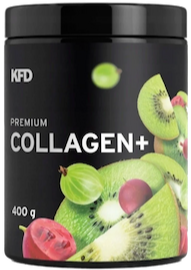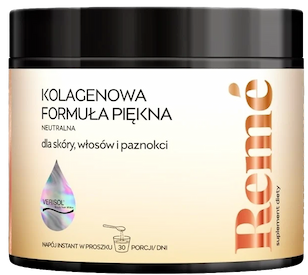Natural collagen: for the face, for joints, in tablets [Ranking].
Everything you need to know about natural collagen so you don't get fooled by a marketing bottle.


Learn more about our editorial process
.

Learn more about our editorial process
.

Learn more about our editorial process
.

Learn more about our editorial process
.![Natural collagen: for the face, for joints, in tablets [Ranking].](https://cdn-resources.natu.care/uploads/1/kolagen_naturalny_hero_f8e886eb4b.jpg)
Why you can trust us
Articles on Natu.Care are written based on scientific research, data from government websites and other reliable sources. The texts are written in cooperation with doctors, nutritionists and other health and beauty experts. Articles are reviewed before publication and during significant updates.
.Learn more about our editorial process
.Information about advertisements
Content on Natu.Care may contain links to products from the sale of which we may receive a commission. When creating content, we adhere to high editorial standards and take care to be objective about the products discussed. The presence of affiliate links is not dictated by our partners, and we select the products we review ourselves completely independently.
.Learn more about our terms and Conditions
.Natural collagen has been gaining popularity in the cosmetic and dietary supplement industry in recent years. Manufacturers conjugate it through all cases in formulations and advertisements. Natural means better. But is this the case with collagen?
.
With pharmacist and educator Ilona Krzak, as well as clinical nutritionist Julia Skrajda, we will tell you what natural collagen is, why you need to supplement it, and how to do it effectively and safely.
From this article you will learn:
- What is natural collagen and native collagen. .
- What is the importance of collagen for you.
- When to provide collagen.
- When to provide collagen in the diet and when with supplements.
- What to look out for.
- What to look for when buying collagen supplements. .
- How to stimulate the skin to produce collagen. .
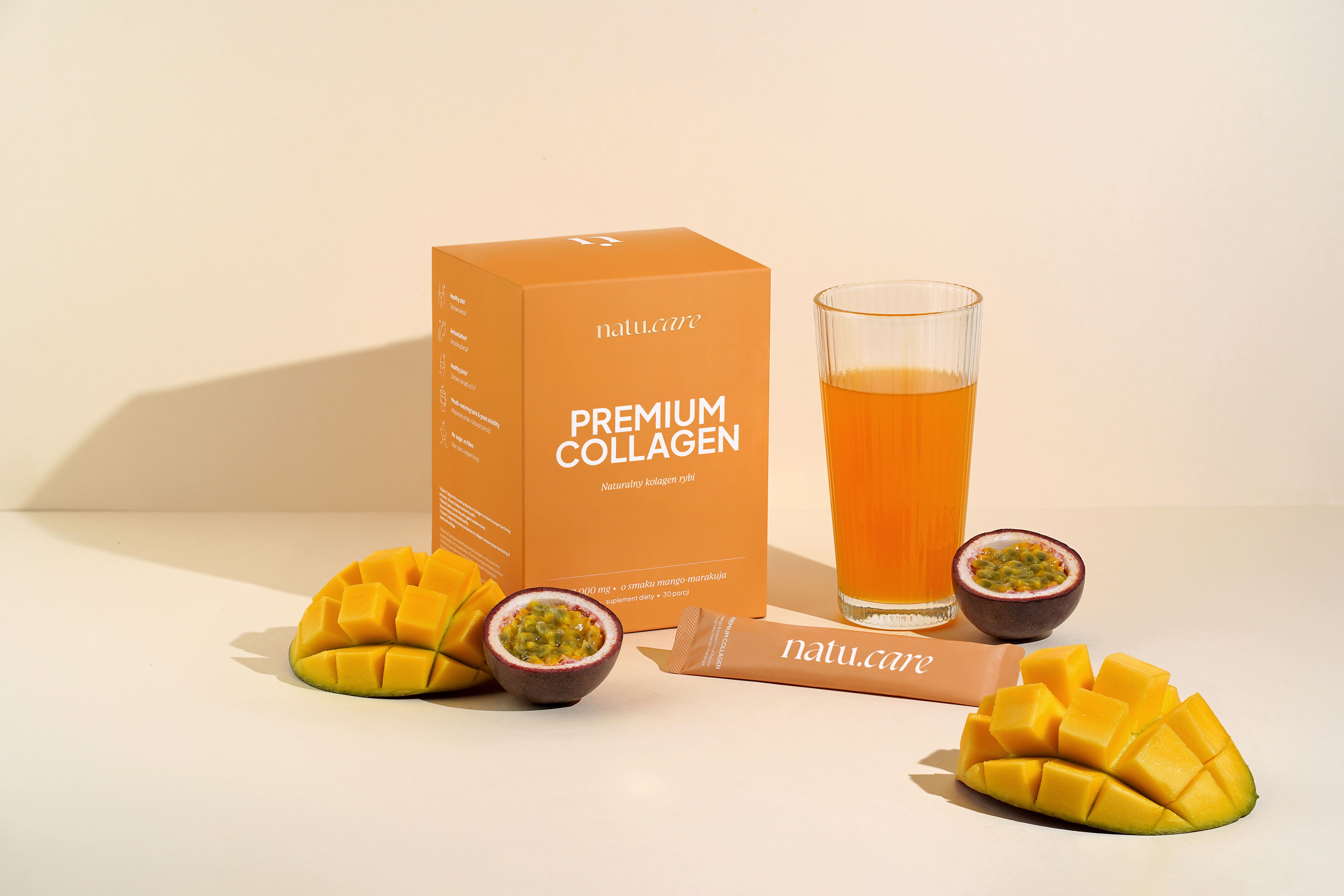
Sprawdź, za co pokochały go tysiące klientek Kolagen Premium 10000 mg, mango-marakuja
Natu.Care Kolagen Premium 10000 mg, mango-marakuja
Natu.Care Kolagen Premium dla zdrowia stawów, skóry, paznokci i włosów. Najlepsza przyswajalność. Optymalna dawka 5 000 lub 10 000 mg. Przebadany przez niezależne laboratorium.
Zobacz więcej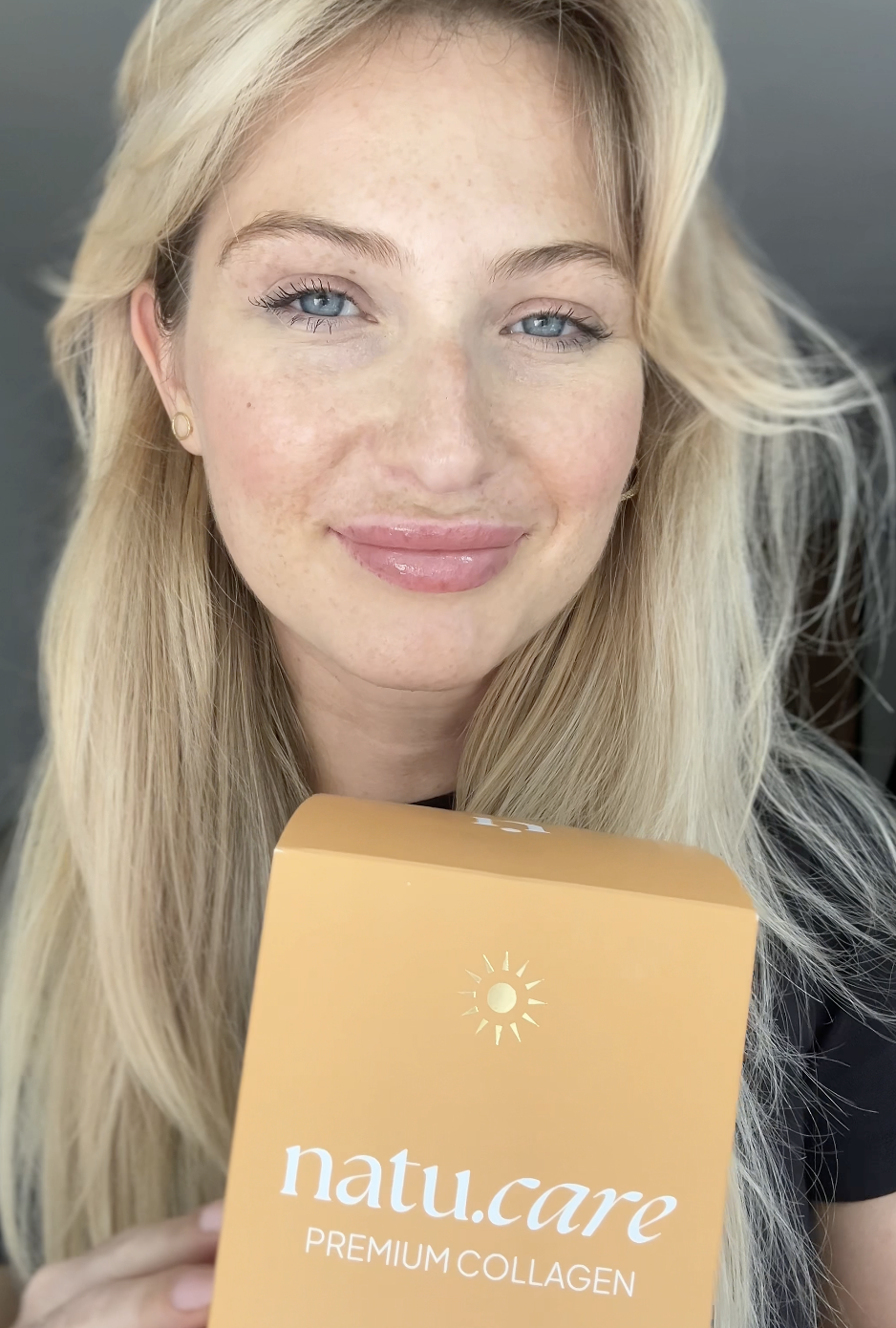
Wybrałam kolagen Natu.Care, ponieważ miał super opinie – a to było dla mnie bardzo ważne! Odkąd go stosuję, moja skóra znacznie się poprawiła i jest nawilżona, a na głowie pojawiły się nowe "baby hair".@Kasia S.
See also:
.
- Most Powerful Collagen - Ranking
- Hair collagen .
- Collagen for nails
- Collagen for skin
- Facial collagen
- Collagen for wrinkles
- Collagen for stretch marks
- Collagen for cellulite
- Collagen for acne
- Collagen for joints
- Collagen for bones
- Collagen for tendons
What is natural collagen?
.
Natural collagen is an essential building protein in living organisms. In your body, it makes up as much as 30% of all proteinsand. It is an important component of skin, bones, muscles, tendons, ligaments and connective tissue. Among other things, it is responsible for the strength, flexibility and regeneration of the skin or joints, builds the skeletal system, improves immunity, strengthens hair and even takes care of the heart.
It's safe to say that collagen glues you together and gives you life - after all, it's the elixir of youth.
Natural collagen is that which comes directly from other organisms. The most common types by origin are:
- fish collagen (marine), .
- beef collagen, .
- pork collagen, .
- poultry collagen, .
On the web you may also come across native collagen. This is one form of collagen that has not undergone any physical or chemical changes. It has its original structure and properties. Natural collagen can refer to the many forms of collagen that are found in living organisms - including both native collagen and modified versions.
You know that highly processed foods are less healthy than home-cooked meals. However, don't translate this logic to collagen supplements.
Native collagen is no better than collagen hydrolysate. One of the main advantages of collagen processing is that the collagen molecules become much smaller (3000-6000 daltons in hydrolysate and 285,000-300,000 daltons in native collagen). As a result, collagen becomes more absorbableand.
Every native collagen is natural collagen, but not every natural collagen is native collagen.
.Providing collagen from outside is necessary because, roughly from the age of 20-25, your natural collagen production capacity decreases and there is no longer enough collagen to meet all your needs.
Natural collagen can be provided both in your diet and in supplements - sometimes the latter is the only option.
Best natural collagen - ranking
.
Collagen is not the same as collagen, which is why we have compiled a list of the best dietary supplements with collagen for you.
Best natural collagen
.
We have selected our suggestions based on the following criteria:
.
- Collagen content. The most effective products, according to research, have between 2.5 and 15 grams of hydrolysed collagen. A lower dose may be insufficient and a higher dose may be unnecessaryand. .
- Purity of formulation. You won't find preservatives or other fillers in the best collagen supplements. .
- Additional active ingredients. Vitamins and minerals that promote collagen synthesis. That's why you'll find products with, among others, vitamin C, which accelerates the absorption and stimulates the body's production of collagenand.
- Testing. Each formulation should be tested by independent, accredited laboratories. .
- Collagen origin. Not all manufacturers report where they source their collagen from. Even fewer of them are concerned about the environment and animal welfare. .
- Taste. To the unpleasant aftertaste we say a definite bleh! After all, supplementation is supposed to be effective and enjoyable. Here you will see the full criteria. .
Natu.Care Collagen Premium 5000 mg, mango-maracuja

- Collagen content: 5000 mg marine collagen hydrolysate
- .
- Additional active ingredients: vitamin C, low molecular weight hyaluronic acid (and L-theanine and coenzyme Q10 in cocoa flavoured collagen or vitamin A and vitamin E in mango–passion fruit flavoured collagen)
- .
- Form: powder sachets
- .
- Dose: 1 sachet per day
- .
- Sufficient for: 30 days
- .
Product description
Fish collagen from the Natu.Care brand in a dose of 5000 mg. The formula contains a sufficient portion of the active substance to positively affect your joints, musculoskeletal system and immunity.
Take care of your tendons, joint cartilage, ligaments, muscles and even bones by supplying them with the building blocks to function properly. Move without bólu and provide the necessary support for any physical activity.
And as a „gratis” to regular supplementation, you will also receive firm skinóhand, healthy and shiny hair and strong nails.
Natu.Care Premium Collagen is available in two flavours – Cacao Bloom and Rise&Shine. Both formulas are based on the following active ingredients: marine collagen hydrolysate, wild roseóbud extract and hyaluronic acid.
Additionally, Cacao Bloom contains natural L-theanine, coenzyme Q10 and defatted Dutch cacao. Rise&Shine instead contains vitamin E and vitamin A.
These are the best collagens in the world.
These best fish collagens on the market also rós taste – Cacao Bloom is a treat for chocolate lovers. Rise&Shine will appeal to those whoóenjoy the refreshing taste of mangoófruit and passion fruit.
Pros and cons
Fish collagen from the Natu.Care brand in a dose of 5000 mg. The formula contains a sufficient portion of the active substance to positively affect your joints, musculoskeletal system and immunity.
Take care of your tendons, joint cartilage, ligaments, muscles and even bones by supplying them with the building blocks to function properly. Move without bólu and provide the necessary support for any physical activity.
And as a „gratis” to regular supplementation, you will also receive firm skinóhand, healthy and shiny hair and strong nails.
Natu.Care Premium Collagen is available in two flavours – Cacao Bloom and Rise&Shine. Both formulas are based on the following active ingredients: marine collagen hydrolysate, wild roseóbud extract and hyaluronic acid.
Additionally, Cacao Bloom contains natural L-theanine, coenzyme Q10 and defatted Dutch cacao. Rise&Shine instead contains vitamin E and vitamin A.
These are the best collagens in the world.
These best fish collagens on the market also rós taste – Cacao Bloom is a treat for chocolate lovers. Rise&Shine will appeal to those whoóenjoy the refreshing taste of mangoófruit and passion fruit.
Additional information
Fish collagen from the Natu.Care brand in a dose of 5000 mg. The formula contains a sufficient portion of the active substance to positively affect your joints, musculoskeletal system and immunity.
Take care of your tendons, joint cartilage, ligaments, muscles and even bones by supplying them with the building blocks to function properly. Move without bólu and provide the necessary support for any physical activity.
And as a „gratis” to regular supplementation, you will also receive firm skinóhand, healthy and shiny hair and strong nails.
Natu.Care Premium Collagen is available in two flavours – Cacao Bloom and Rise&Shine. Both formulas are based on the following active ingredients: marine collagen hydrolysate, wild roseóbud extract and hyaluronic acid.
Additionally, Cacao Bloom contains natural L-theanine, coenzyme Q10 and defatted Dutch cacao. Rise&Shine instead contains vitamin E and vitamin A.
These are the best collagens in the world.
These best fish collagens on the market also rós taste – Cacao Bloom is a treat for chocolate lovers. Rise&Shine will appeal to those whoóenjoy the refreshing taste of mangoófruit and passion fruit.
User review
Fish collagen from the Natu.Care brand in a dose of 5000 mg. The formula contains a sufficient portion of the active substance to positively affect your joints, musculoskeletal system and immunity.
Take care of your tendons, joint cartilage, ligaments, muscles and even bones by supplying them with the building blocks to function properly. Move without bólu and provide the necessary support for any physical activity.
And as a „gratis” to regular supplementation, you will also receive firm skinóhand, healthy and shiny hair and strong nails.
Natu.Care Premium Collagen is available in two flavours – Cacao Bloom and Rise&Shine. Both formulas are based on the following active ingredients: marine collagen hydrolysate, wild roseóbud extract and hyaluronic acid.
Additionally, Cacao Bloom contains natural L-theanine, coenzyme Q10 and defatted Dutch cacao. Rise&Shine instead contains vitamin E and vitamin A.
These are the best collagens in the world.
These best fish collagens on the market also rós taste – Cacao Bloom is a treat for chocolate lovers. Rise&Shine will appeal to those whoóenjoy the refreshing taste of mangoófruit and passion fruit.
Natu.Care Collagen Premium 10000 mg, cherry

- Collagen content: 10,000 mg of hydrolyzed bovine collagen
- Additional active ingredients: vitamin C, low molecular weight hyaluronic acid, glucosamine, chondroitin, extract of Indian frankincense resin (boswellia serrata)
- Form: powder sachets for drinking
- Serving: 1 sachet per day
- Lasts for: 30 days
Product description
One of the strongest collagens on the market, providing as much as 10,000 mg per daily serving. This product can effectively support the condition of joints, skin, hair, and nails.
With this supplement, you will support your skeletal and joint system as well as your beauty, helping you visually halt the aging process and feel rejuvenated!
Pros and cons
Pros:
- The daily portion of collagen is very large – as much as 10,000 mg.
- Proven collagen formula – COLLinstant, whose effectiveness has been confirmed in clinical studies.
- Effective dose of hyaluronic acid, which additionally moisturizes the skin and positively affects joint health.
- Vitamin C supports the body's natural collagen production.
- Glucosamine is a fundamental building block of compounds found in joint cartilage and a component of collagen that gives elasticity to connective tissue in tendons.
- Chondroitin is a natural component found in the human body, mainly in cartilage. This large molecule (mucopolysaccharide) has the ability to absorb water, which helps maintain the elasticity and resilience of cartilage.
- Frankincense resin extract supports blood circulation and joint mobility and reduces their stiffness. It may help alleviate inflammatory conditions.
- The composition has been tested by the independent and accredited J.S. Hamilton laboratory.
Cons:
- None.
Additional information
Users praise Natu.Care Collagen Premium for the easy dissolving of the powder.
ALLDEYNN Collarose Fish
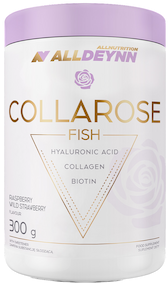
- Collagen content: 5000 mg hydrolysate fish collagen VERISOL F® .
- Additional active ingredients: vitamin C, hyaluronic acid, biotin
- Form: powder to dissolve in water .
- Dose: one scoop (6 g) of powder daily .
- Sufficient for: 50 days .
Product description
Atlantic cod collagen VERISOL F® contained in the formula are easily absorbed collagen peptides of fish origin. Regular supplementation can firm your skinóhand and slow down the ageing process. Your nails will become stronger and stop breaking. The addition of biotin will improve the condition of your hairów. The collagen portion is high enough to also have a good effect on your joints, muscles and bones.
Pros and cons
Atlantic cod collagen VERISOL F® contained in the formula are easily absorbed collagen peptides of fish origin. Regular supplementation can firm your skinóhand and slow down the ageing process. Your nails will become stronger and stop breaking. The addition of biotin will improve the condition of your hairów. The collagen portion is high enough to also have a good effect on your joints, muscles and bones.
Additional information
Atlantic cod collagen VERISOL F® contained in the formula are easily absorbed collagen peptides of fish origin. Regular supplementation can firm your skinóhand and slow down the ageing process. Your nails will become stronger and stop breaking. The addition of biotin will improve the condition of your hairów. The collagen portion is high enough to also have a good effect on your joints, muscles and bones.
Expert and user opinion
Atlantic cod collagen VERISOL F® contained in the formula are easily absorbed collagen peptides of fish origin. Regular supplementation can firm your skinóhand and slow down the ageing process. Your nails will become stronger and stop breaking. The addition of biotin will improve the condition of your hairów. The collagen portion is high enough to also have a good effect on your joints, muscles and bones.
DuoLife Collagen fish collagen 2500 mg
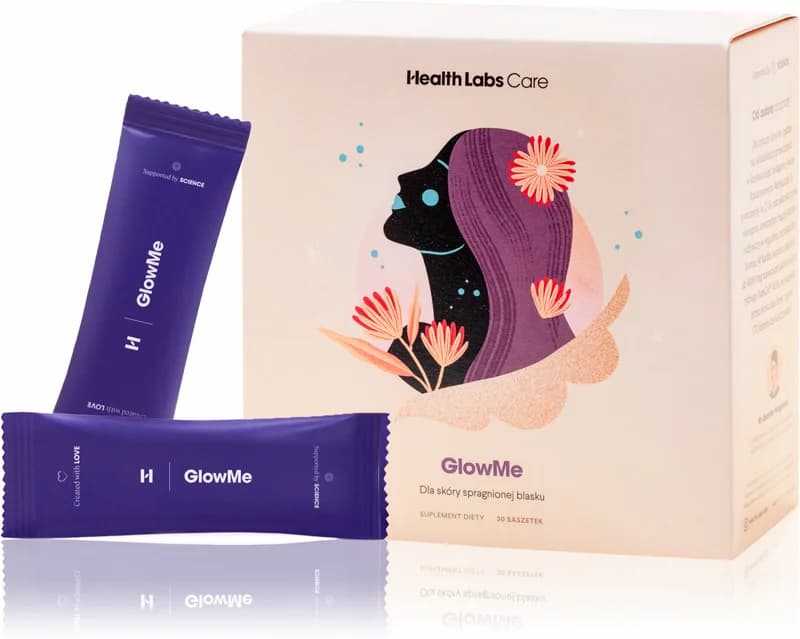
- Collagen content: 2500 mg collagen
- Additional active ingredients: vitamin C, silicon, glucosamine, hyaluronic acid, nettle and bamboo extracts
- Form: liquid to drink .
- Dose:25 ml .
- Sufficient for: 30 days .
Product description
100% natural collagen liquid without unnecessary ingredientsós. The composition of ingredientsós improves the appearance and condition of skinóry, hairów, nails. DuoLife is a good choiceór if you notice the first signs of skinóry ageing or want to stop this process. A tasty liquid, convenient to use.
Pros and cons
100% natural collagen liquid without unnecessary ingredientsós. The composition of ingredientsós improves the appearance and condition of skinóry, hairów, nails. DuoLife is a good choiceór if you notice the first signs of skinóry ageing or want to stop this process. A tasty liquid, convenient to use.
Additional information
100% natural collagen liquid without unnecessary ingredientsós. The composition of ingredientsós improves the appearance and condition of skinóry, hairów, nails. DuoLife is a good choiceór if you notice the first signs of skinóry ageing or want to stop this process. A tasty liquid, convenient to use.
User review
100% natural collagen liquid without unnecessary ingredientsós. The composition of ingredientsós improves the appearance and condition of skinóry, hairów, nails. DuoLife is a good choiceór if you notice the first signs of skinóry ageing or want to stop this process. A tasty liquid, convenient to use.
Pharmovit liquid collagen 10000 mg
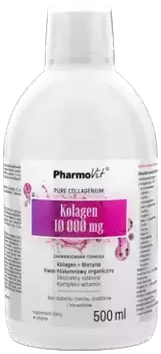
- Collagen content: 10000 mg hydrolysed bovine collagen types I and III .
- Additional active ingredients: hyaluronic acid, natural plant extracts, vitamin C, B vitamins, zinc, vitamin D
- Form: vials .
- Dose: 25 ml .
- Sufficient for: 20 days .
Product description
A solid daily dose of collagen for jointómuscle and bone health and beauty. The duo of collagen and vitamin C has a positive effect on each other, so that „the protein of youth” is better absorbed and more efficiently produced in the body.
Pros and cons
A solid daily dose of collagen for jointómuscle and bone health and beauty. The duo of collagen and vitamin C has a positive effect on each other, so that „the protein of youth” is better absorbed and more efficiently produced in the body.
Additional information
A solid daily dose of collagen for jointómuscle and bone health and beauty. The duo of collagen and vitamin C has a positive effect on each other, so that „the protein of youth” is better absorbed and more efficiently produced in the body.
KFD Premium Collagen+
Product description
High dose of collagen and a real bomb of vitamins C and D and organic sulphur. With this preparation the effects will come immediately. You will improve the firmness of your skin and reduce wrinkles. Your hair and nails will be strong and shiny.
A generous dose of collagen will improve the mobility of your jointsós, benefit your bone system and muscles. Do you do sports and need a product thatós able to keep up with your needs? This product will do the trick.
Pros and cons
High dose of collagen and a real bomb of vitamins C and D and organic sulphur. With this preparation the effects will come immediately. You will improve the firmness of your skin and reduce wrinkles. Your hair and nails will be strong and shiny.
A generous dose of collagen will improve the mobility of your jointsós, benefit your bone system and muscles. Do you do sports and need a product thatós able to keep up with your needs? This product will do the trick.
Additional information
High dose of collagen and a real bomb of vitamins C and D and organic sulphur. With this preparation the effects will come immediately. You will improve the firmness of your skin and reduce wrinkles. Your hair and nails will be strong and shiny.
A generous dose of collagen will improve the mobility of your jointsós, benefit your bone system and muscles. Do you do sports and need a product thatós able to keep up with your needs? This product will do the trick.
Expert opinion
High dose of collagen and a real bomb of vitamins C and D and organic sulphur. With this preparation the effects will come immediately. You will improve the firmness of your skin and reduce wrinkles. Your hair and nails will be strong and shiny.
A generous dose of collagen will improve the mobility of your jointsós, benefit your bone system and muscles. Do you do sports and need a product thatós able to keep up with your needs? This product will do the trick.
Product description
The dietary supplement from Remé contains beef collagen in a patented formula and vitamin C, whichóra aids its absorption. The formula comes in three flavours: neutral, orange-maracuja and strawberry-pomegranate. The formula can effectively support and improve the condition of the skinóry, hairóry and nails.
Pros and cons
The dietary supplement from Remé contains beef collagen in a patented formula and vitamin C, whichóra aids its absorption. The formula comes in three flavours: neutral, orange-maracuja and strawberry-pomegranate. The formula can effectively support and improve the condition of the skinóry, hairóry and nails.
Additional information
The dietary supplement from Remé contains beef collagen in a patented formula and vitamin C, whichóra aids its absorption. The formula comes in three flavours: neutral, orange-maracuja and strawberry-pomegranate. The formula can effectively support and improve the condition of the skinóry, hairóry and nails.
The dietary supplement from Remé contains beef collagen in a patented formula and vitamin C, whichóra aids its absorption. The formula comes in three flavours: neutral, orange-maracuja and strawberry-pomegranate. The formula can effectively support and improve the condition of the skinóry, hairóry and nails.
{ product:50HBCaQiAK7rywRIgM1nYm }}
See also:
.
- What collagen to choose or more specifically: .
- What collagen to drink
- What kind of collagen powder
- What kind of collagen in sachets
- What kind of liquid collagen
- What collagen in tablets
- What kind of collagen in capsules
Which natural collagen to choose?
.
When purchasing a collagen supplement consider the following aspects:
.
- .
- Collagen content - research suggests that a dose of 2,500-15,000 mg is safe for long-term useand. The optimal daily requirement is around 4,000-5,000 mg. Collagen is difficult to overdose on however, it is definitely better to take 10 000 mg than just 200 or 400 mg. The largest portions of collagen are in collagen powder (in sachets) and for drinking, also in liquid form. .
- Purpose of supplementation and type of collagen: collagen type I and III have more effect on hair, skin and nails, while collagen type 2 - on joints. .
- Origin - decide whether you prefer fish collagen (sea collagen), beef collagen, pork collagen, or maybe poultry collagen.
- Form - you can choose primarily from powdered collagen, drinkable collagen, collagen in tablets or capsules and liquid collagen. .
- Position - it matters whether you are taking natural collagen, collagen hydrolysate or perhaps liophilised collagen; whether it is powdered animal cartilage or, however, biologically active peptides. Consider that hydrolysates have smaller particles, so are better absorbed. .
- Other active ingredients: supplements with collagen should definitely also contain vitamin C (supports natural collagen synthesis). In addition, look for ingredients such as hyaluronic acid, coenzyme Q10, field horsetail extract, silica, D-biotin, zinc, copper, vitamin A, manganese and omega-3 acids or MSM. .
When choosing collagen, pay attention to whether it is hydrolysate or native collagen. When you're faced with this dilemma, remember that it's best to choose hydrolysate - because of its particle size, it shows much better bioavailability.
Collagen hydrolysate in the form of collagen peptides has a mass of only 3-6 kDa, while natural (native) collagen is as much as 285-300 kDa..
 .
.
Ilona Krzak Master of Pharmacy
Processing collagen and its hydrolysate can result in formulations with different peptide and amino acid profiles, which can affect efficacy.
Unfortunately, it is often the case that the manufacturer does not state what type (type) of collagen is in the supplement or what it was derived from. Some pride themselves on using a patented form of collagen (e.g. Verisol, NatiCol, Peptan), but even then they do not necessarily provide this information.
There are also products with so-called complexes. The dose of the complex rarely refers to the collagen itself. It is given in total for the whole, in which there are also other substances, including, for example, hyaluronic acid..
 .
.
Ilona Krzak Master of Pharmacy
The best absorbed are fish collagen hydrolysates (English marine collagen). They are the most similar to human collagen in terms of structure. As a result, the risk of allergy or hypersensitivity is minimal.
Research has shown that a serving of at least 500 mg of hydrolysate sea collagen per day is effective. For collagens of other origins, this range is as high as 2,500-10,000 mg..
 .
.
Ilona Krzak Master of Pharmacy
.
See also:
.
.
What will natural collagen help with?
.
Because of its key role as the main structural protein in the body, natural collagen positively affects many aspects of your health and beautyand. This is why it is called the protein of youth and you can find it in both dietary supplements and cosmetics.
Collagen for the skin
.
Natural collagen improves the appearance of the skin, acts as a moisturiser, improves skin elasticity, reduces the depth and visibility of wrinkles. In addition, it lightens dark circles under the eyes, reduces hyperpigmentation and is used to combat cellulite, stretch marks and scars. It can also help combat the unpleasant consequences of acne.
Collagen can also be found in many cosmetics, such as creams or gels. However, their effectiveness will not be satisfactory, because the collagen molecules used there are too large to penetrate into the dermis. Instead, they form a special film that helps to retain water, which has a positive effect on the firmness and hydration of the skin.
See also:
.
- Collagen for skin .
- Collagen for hair
- Collagen for nails
- Facial collagen
- Collagen for wrinkles
- Collagen for stretch marks
- Collagen for cellulite
- Collagen for acne
Collagen for joints, bones and spine
.
Type 2 collagen is most abundant in joint cartilage and intervertebral discs. Type II collagen hydrolysate will help regenerate tired and strained joints.
As we age, collagen production decreases, which is also noticeable in the musculoskeletal system. As a result, joints have poorer lubrication, cartilage wears down more quickly and inflammation builds up - all of which will result in increasing pain.
As a result of this, the joints are less well lubricated.
For joints, knees and spine, longer supplementation will be required.
Research shows that a reduction in knee pain can be achieved with 10g collagen supplementation for at least 6 months..
 .
.
Ilona Krzak Master of Pharmacy
.
It is worth noting that researchers have shown synergy in the effects of collagen, chondroitin and glucosamine. Glucosamine alone without chondroitin (and vice versa) will have no effect. Therefore, if you are looking for collagen products for your joints, read the ingredients carefully. The best ones will have collagen, chondroitin and glucosamine in high doses.
Research has also shown the effectiveness of oral supplementation with type 2 collagen in reducing joint swelling in rheumatoid arthritis (RA) - in this case, low-dose (40 mg) native collagen is sufficient.and. In this case, the action of collagen is not to rebuild the joint, but to 'desensitise' the body to collagen, which is treated as a foreign body and consequently - destroyed.
Collagen supplementation - which will last for at least 12 months - can significantly increase bone density and strength.
See also:
.
In addition, collagen can have effects such as:
- strengthens hair and nails, .
- promotes wound healing, .
- hastens skin regeneration and new tissue formation, .
- supports intestinal health and muscle function, .
- protects the cardiovascular system, .
I don't like tablets - what alternatives do I have?
.
Many collagen preparations have appeared on the market in recent years, and manufacturers are doing their best to appeal to the widest possible range of tastes. Therefore, you can choose from virtually any form you can imagine:
- collagen in capsules, .
- collagen in tablets, .
- collagen powder, .
- collagen for drinking, .
- collagen in liquid,
- collagen in gel, .
- collagen injections, .
Which one will you choose for yourself?
.
Remember that supplementation cannot replace a proper diet and physical activity. It is meant to be your support, not your main weapon in the fight for health and well-being.
.

Sprawdź, za co pokochały go tysiące klientek Kolagen Premium 10000 mg, mango-marakuja
Natu.Care Kolagen Premium 10000 mg, mango-marakuja
Natu.Care Kolagen Premium dla zdrowia stawów, skóry, paznokci i włosów. Najlepsza przyswajalność. Optymalna dawka 5 000 lub 10 000 mg. Przebadany przez niezależne laboratorium.
Zobacz więcej
Wybrałam kolagen Natu.Care, ponieważ miał super opinie – a to było dla mnie bardzo ważne! Odkąd go stosuję, moja skóra znacznie się poprawiła i jest nawilżona, a na głowie pojawiły się nowe "baby hair".@Kasia S.
Natural collagen - in food or supplementation?
.
As you already know, collagen is an animal protein that is present especially in cartilage, skin and bones. If you want to provide collagen with your diet, you need to eat exactly that.
An additional solution is also meat jellies prepared with gelatine. Gelatin, too, is made from properly processed cartilage and bones - you can think of it a bit like hydrolysed collagen, 'but less so'.
Products rich in collagen include:
- chicken feet jelly, .
- pork leg jellies, .
- fishes in jelly,
- cooked cartilage,
- fish in jelly
- cooked cartilage, .
- offal, .
- meat preparations (e.g. brawn), .
- fruit jellies, .
Note that all the products listed above are potential calorie bombs. If you need to take care of the right calorie balance (or control cholesterol), such a collagen diet could spoil you.
It is important to combine collagen-containing foods with flavonoids, the greatest source of which are vegetables and fruit. Flavonoids protect the protein from breakdown and increase its bioavailability..
 .
.
Julia SkrajdaDietitian
.Natural collagen taken in food can serve as a donor of amino acids needed for endogenous collagen synthesis..
 .
.
Ilona Krzak Master of Pharmacy
.
Simplify: if you want to rebuild collagen levels - whether you're in your 30s or 60s - you need to remember fruit and vegetables in addition to collagen.
And collagen - in food and supplements - can help your body not only make up for deficiencies, but also produce its own!
If you're not eating meat and animal products, you're not providing natural collagen in your diet.
There is no such thing as vegan collagen, although scientists are working on collagen extracted from bacteria, bamboo, rice and yeast.
In this case, it is essential to make sure you are eating fruit and vegetables that support natural collagen production. Among others, the following should appear on your plate:
- mustard seeds,
- currants
- citrus, .
- leaf vegetables, .
- fasola, .
- avocado, .
- pumpkin, .
- soy products, .
- whole grain products, .
In your food, you can provide other ingredients important in collagen production, such as lysine or proline.
Vitamin C is one of the biggest antioxidants and stimulates the body to synthesise collagen.
.
Nevertheless, you may not be in the mood to gorge on cartilage and cold feet, so you can choose one of the many collagen supplements available:
- They allow for precise dosage and control of intake. .
- This is a convenient solution for those who find it difficult to get enough collagen through diet.
- They are also available in a variety of sizes.
People with an abnormal lipid profile and cholesterol problems will definitely benefit better from supplementation.
.
 .
.
Julia SkrajdaDietitian
..
And if you're wondering which is better - providing collagen in food or supplementation - then (unfortunately) there is no clear answer.
The main difference is in the goals and the effect you want to achieve.
If you want to strengthen your joints, it will be more effective to obtain it from the diet, due to its better bioavailability. If you want to improve the condition and strengthen hair, skin or nails - choose supplementation..
 .
.
Julia SkrajdaDietitian
.Statistically, you will achieve the best results by combining a collagen-rich diet and supplementation, tailored to your preferences, needs and lifestyle.
See also:
- Best Collagen - Ranking .
- What destroys collagen in the body
- Liophilised collagen
- Collagen peptides
- Collagen supplements .
Summary
.
- Natural collagen is the basic building protein of living organisms.
- In your body, it makes up as much as 30% of all proteins. .
- Natural collagen is important for the health and condition of your skin, bones, joints, hair, nails and even your heart.
- Natural collagen is important for the health and condition of your skin, bones, joints, hair, nails and even your heart.
- We have a natural ability to produce collagen, but this weakens as we age, so it needs to be provided through diet or supplements. .
- Native collagen is collagen that has not undergone any modification. .
- Natural collagen in its various forms - hydrolysates, peptides - can be of beef, pork, poultry or fish origin. .
- Natural fish collagen is the best absorbed form of collagen, which is why experts recommend supplements with hydrolysed fish collagen. .
FAQ
.Which collagen to choose for wrinkles?
.Because of its similarity to human collagen, the best collagen for wrinkles will be fish collagen (sea collagen). Look for supplements in hydrolysate form. The most effective doses are 2.5-15 g.
.Remember that you will get the best results if you combine supplementation with proper skin care. Use facial serums, vitamin C serums or anti-wrinkle creams.
Please be sure to take advantage of this.
See also: Collagen for wrinkles
.What are the symptoms of collagen deficiency?
The most important symptoms of collagen deficiency include:
.
- deterioration of the skin (lack of elasticity, oiliness), .
- broken hair and nails, .
- decrease in immunity,
- decreased immune function.
- circulatory and intestinal problems,
- longer convalescence, .
- longer recovery from illness and injury,
- lack of appetite.
- lack of appetite, .
- pain in the joints, .
See more: Collagen deficiency - how to deal with them?
.
Where is the most collagen found?
.The best sources of collagen in food are primarily:
.- beef or pork bone broth, .
- chicken with skin, .
- cicken feet, .
- sardines, .
- gelatin, .
- seafood, .
- meat and cartilage, .
- meat jellies, .
See also: Collagen - 47 facts you don't know and What destroys collagen in the body
.Is there collagen in the egg?
.Research has shown that in eggs, collagen is found primarily in the yolkand. In the fibres of the eggshell membranes, type X collagen is primarily present . The collagen content of eggs can vary due to, among other things, the diet and farming method of the hens .
How to apply natural collagen to the face
.External application of collagen to the skin in creams or gels does not have the desired effect. All because the collagen molecules are too large to penetrate the dermis. Cosmetics with collagen create a special film that prevents water loss and helps hydrate skin, which has an impact on firmness and smoothness.
If you want to improve the condition of your skin, collagen supplements are best. You can also look for cosmetics with collagen peptides, which are molecules that are much smaller than normal collagen.
See also: Facial collagen
.What kind of collagen for children to choose?
.For children, the best choice is fish collagen of sea origin - preferably in hydrolysate form.
This type of collagen is usually better tolerated by the body (animal collagen is more likely to be allergenic). In addition, it is similar to human collagen, so it is absorbed better and quicker.
Please be aware of the following.
Remember that collagen supplements are not a substitute for a balanced diet and physical activity.
Check: What destroys collagen in the body?
.How to stimulate the skin to produce collagen?
.According to available research, there are several ways to stimulate the skin to produce collagen. Among the most important are:
- a healthy diet - rich in vitamin A, vitamin C, amino acids and copper, which promote collagen synthesis; .
- cosmetic treatments - especially chemical peeling, laser therapy, microneedling, IPL; .
- supplementation - hydrolysed collagen in the form of peptides and the addition of vitamin C and hyaluronic acid is the best choice; .
- protection from UV radiation - creams with sunscreen and high SPF are a must; .
- avoidance of smoking and excessive alcohol consumption - the compounds they contain weaken collagen structure and accelerate the skin ageing process; .
See also: Collagen for skin
.Can collagen give side-effects?
.Although collagen supplements are safe and it takes real effort to get an excess of it in the body, it can sometimes give side effects. The most common are:
- allergic reactions - beef collagen is the most allergenic; .
- digestive problems - bloating, indigestion, diarrhoea, constipation, abdominal pain; .
- metallic aftertaste; .
There is a higher risk of side effects associated with injectable collagen. You may experience swelling, redness of the skin, infection, rash or scarring, among others.
To avoid side effects, follow the manufacturer's instructions.
Check also: What collagen to choose?
..
Resources
.See all
.León-López, A., Morales-Peñaloza, A., Martínez-Juárez, V. M., Vargas-Torres, A., Zeugolis, D. I., & Aguirre-Álvarez, G. (2019). Hydrolyzed Collagen-Sources and Applications. Molecules, 24(22), 4031. https://doi.org/10.3390/molecules24224031
Baltazar, T., Kajave, N. S., Rodriguez, M., Chakraborty, S., Jiang, B., Skardal, A., Kishore, V., Pober, J. S., & Albanna, M. Z. (2022). Native human collagen type I provides a viable physiologically relevant alternative to xenogeneic sources for tissue engineering applications: A comparative in vitro and in vivo study. Journal of Biomedical Materials Research Part B: Applied Biomaterials, 110(10), 2323-2337. https://doi.org/10.1002/jbm.b.35080
Bolke, L., Schlippe, G., Gerß, J., & Voss, W. (2019). A Collagen Supplement Improves Skin Hydration, Elasticity, Roughness, and Density: Results of a Randomized, Placebo-Controlled, Blind Study. Nutrients, 11(10), 2494. https://doi.org/10.3390/nu11102494
Chattopadhyay, S., & Raines, R. T. (2014). Collagen-based biomaterials for wound healing. Biopolymers, 101(8), 821-833. https://doi.org/10.1002/bip.22486
Fassini, D., Duarte, A. R. C., Reis, R. L., & Silva, T. H. (2017). Bioinspiring Chondrosia reniformis (Nardo, 1847) Collagen-Based Hydrogel: A New Extraction Method to Obtain a Sticky and Self-Healing Collagenous Material. Marine Drugs, 15(12), Article 12. https://doi.org/10.3390/md15120380
Lee, D., Kim, T.-H., Lee, H.-H., Kim, J.-M., Jeon, D.-S., & Kim, Y.-S. (2015). A Pilot Study of the Impacts of Menopause on the Anogenital Distance. Journal of Menopausal Medicine, 21(1), 41-46. https://doi.org/10.6118/jmm.2015.21.1.41
Shoulders, M. D., & Raines, R. T. (2009). Collagen Structure and Stability. Annual Review of Biochemistry, 78(1), 929-958. https://doi.org/10.1146/annurev.biochem.77.032207.120833
Silva, T. H., Moreira-Silva, J., Marques, A. L. P., Domingues, A., Bayon, Y., & Reis, R. L. (2014). Marine Origin Collagens and Its Potential Applications. Marine Drugs, 12(12), 5881-5901. https://doi.org/10.3390/md12125881
Yes, Y. J., Kim, Y. J., Lee, J. G., Yi, Y.-H., Cho, Y. H., Kang, G. H., & Lee, S. Y. (2019). Effect of Oral Ingestion of Low-Molecular Collagen Peptides Derived from Skate (Raja Kenojei) Skin on Body Fat in Overweight Adults: A Randomized, Double-Blind, Placebo-Controlled Trial. Marine Drugs, 17(3), 157. https://doi.org/10.3390/md17030157
Tzaphlidou, M. (2008). Bone Architecture: Collagen Structure and Calcium/Phosphorus Maps. Journal of Biological Physics, 34(1-2), 39-49. https://doi.org/10.1007/s10867-008-9115-y
Walters, B. D., & Stegemann, J. P. (2014). Strategies for directing the structure and function of three-dimensional collagen biomaterials across length scales. Acta Biomaterialia, 10(4), 1488-1501. https://doi.org/10.1016/j.actbio.2013.08.038
Wang, X., Ford, B., Praul, C., & Leach, R. (2002). Collagen X expression in oviduct tissue during the different stages of the egg laying cycle. Poultry Science, 81(6), 805-808. https://doi.org/10.1093/ps/81.6.805
Yagoda MD, M. R., & Gans PhD, E. H. (2012). A Nutritional Supplement Formulated with Peptides, Lipids, Collagen and Hyaluronic Acid Optimizes Key Aspects of Physical Appearance in Nails, Hair and Skin. Journal of Nutrition & Food Sciences, s5. https://doi.org/10.4172/2155-9600.S5-002
Yamauchi, K., Matsumoto, Y., & Yamauchi, K. (2016). Egg collagen content is increased by a diet supplemented with wood charcoal powder containing wood vinegar liquid. British Poultry Science, 57(5), 601-611. https://doi.org/10.1080/00071668.2016.1206193
Jelonek, L. (2023). Collagen. Everything you need to know (B. Turczynski, ed.; 1st ed.). Natu.Care. https://books.google.com/books?vid=9788396887801
..
Editorials
Meet the team

Ilona Krzak obtained her Master of Pharmacy degree from the Medical University of Wrocław. She did her internship in a hospital pharmacy and in the pharmaceutical industry. She is currently working in the profession and also runs an educational profile on Instagram: @pani_z_apteki

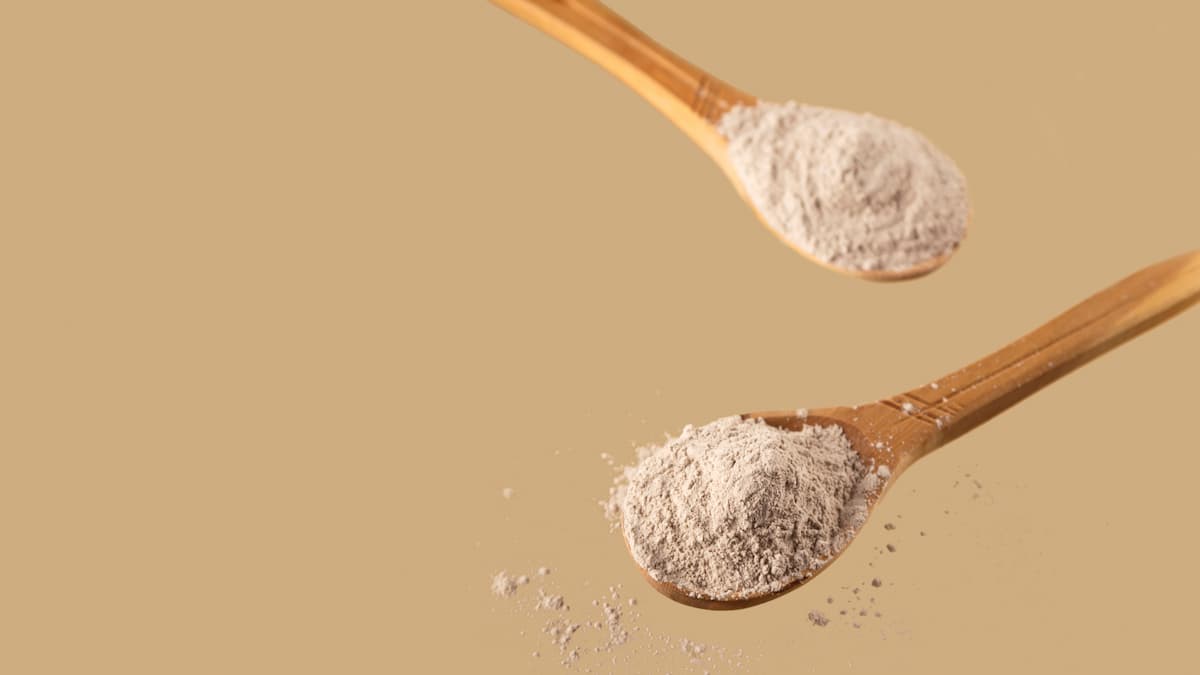
Everything you want to know about COLLinstant collagen.

Collibre collagen is an interesting supplement in shot form.
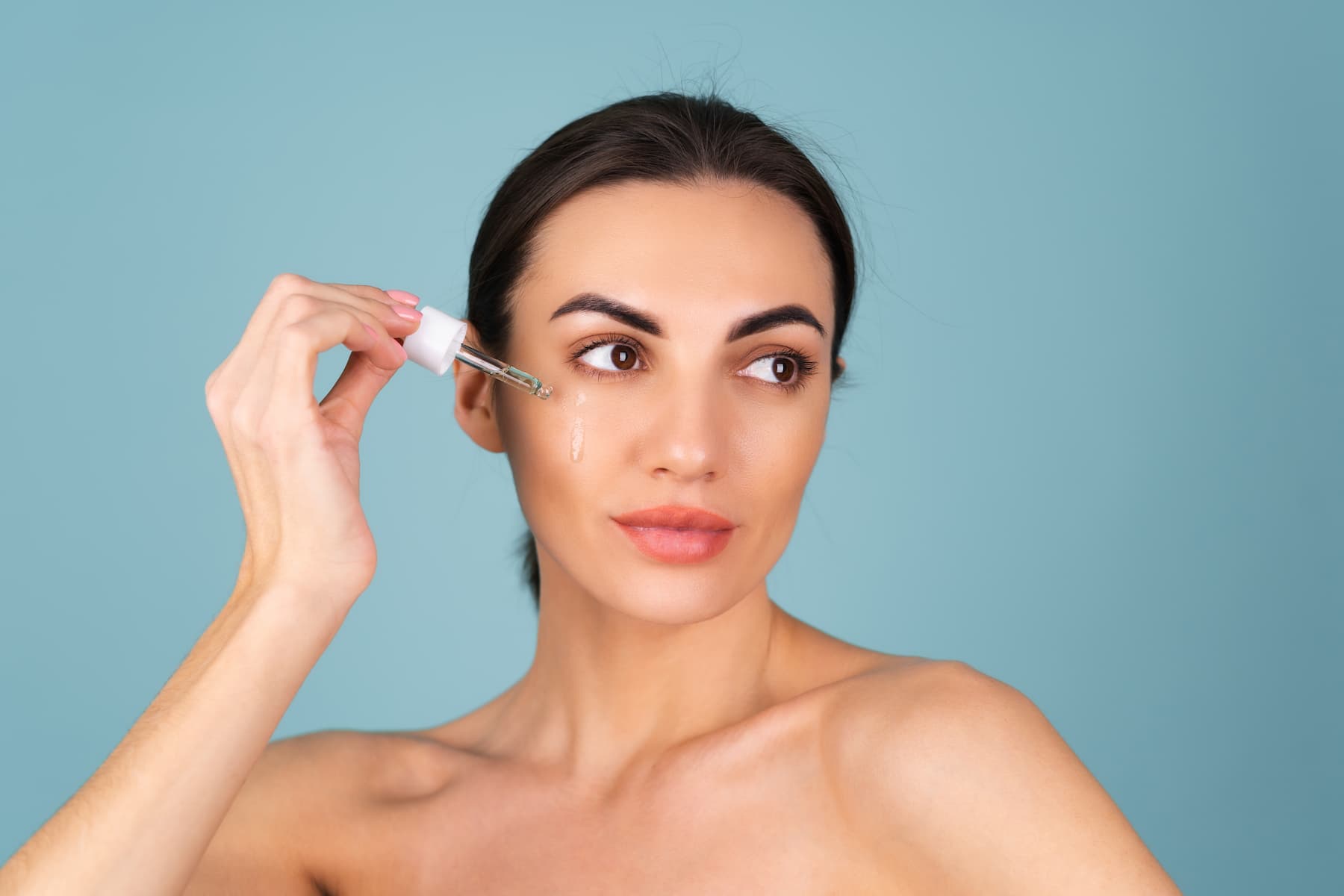
Solgar collagen with hyaluronic acid is a dietary supplement that supports skin and joint health.
